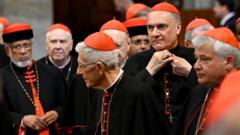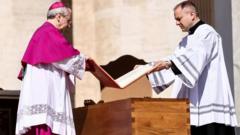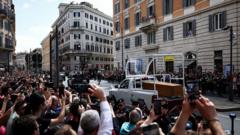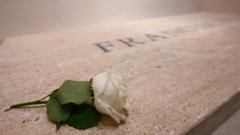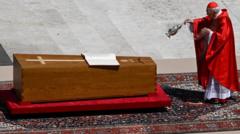With Africa's Catholic population growing significantly, many believe the Church's leadership should reflect this demographic shift, although challenges persist.
**Could the Next Pope Be African? Exploring the Possibility of a Pontiff from the Continent**

**Could the Next Pope Be African? Exploring the Possibility of a Pontiff from the Continent**
As the Catholic Church faces a pivotal moment, discussions intensify over the prospect of an African pope following Pope Francis.
In the wake of Pope Francis's eventual successor announcement, conversations surrounding the potential for an African pope have gained traction. The Catholic Church is experiencing unprecedented growth in Africa, which currently accounts for more than half of the global increase in faithful. Despite having had three African popes historically, none have been appointed in the last 1,500 years, raising questions about representation within Church leadership.
Father Stan Chu Ilo, a Nigerian Catholic priest, highlights the importance of an African pope, stating that Church leadership ought to represent its diverse global congregation. However, he recognizes that the lack of senior African clergy in influential Vatican positions could hinder such an outcome. Notably, prominent figures like Cardinal Robert Sarah from Guinea and Cardinal Fridolin Ambongo Besungu from the Democratic Republic of Congo have gained visibility in the global Catholic discourse, further raising the profile of potential African candidates.
Amid these evolving dynamics, Cardinal Peter Turkson from Ghana remains a strong contender, with previous roles at the Vatican establishing him as a respected presence. The appointment of Pope Francis has already increased the proportion of sub-Saharan African cardinals, yet critics question whether this increase directly correlates to greater power within the Church.
Another perspective comes from Professor Paulinus Ikechukwu Odozor, who cautions against appointing a pope solely based on geographic origins. He emphasizes the need for a pope to engage deeply with spiritual traditions and unite all congregations, regardless of their backgrounds. Odozor suggests that Africans often feel marginalized within Church discussions, which can lead to a desire for representation at the highest level.
Pope Francis has garnered respect in Africa for his advocacy on various issues, including poverty and local injustices, while simultaneously facing pushback over his liberal stances on LGBTQ matters, which are often in conflict with traditional African viewpoints. Notably, influential African cardinals have expressed disapproval of the pope's openness towards same-sex blessings.
As discussions evolve, the possibility of an African pope ignites hope among many clerics. However, deep-seated challenges such as power dynamics, historical biases, and racism within the Church may pose significant hurdles to the realization of this dream. As the conclave approaches, observers will remain watchful, hoping for a leader who echoes the compassionate outlook of Pope Francis while being representative of Africa's growing Catholic population.
Father Stan Chu Ilo, a Nigerian Catholic priest, highlights the importance of an African pope, stating that Church leadership ought to represent its diverse global congregation. However, he recognizes that the lack of senior African clergy in influential Vatican positions could hinder such an outcome. Notably, prominent figures like Cardinal Robert Sarah from Guinea and Cardinal Fridolin Ambongo Besungu from the Democratic Republic of Congo have gained visibility in the global Catholic discourse, further raising the profile of potential African candidates.
Amid these evolving dynamics, Cardinal Peter Turkson from Ghana remains a strong contender, with previous roles at the Vatican establishing him as a respected presence. The appointment of Pope Francis has already increased the proportion of sub-Saharan African cardinals, yet critics question whether this increase directly correlates to greater power within the Church.
Another perspective comes from Professor Paulinus Ikechukwu Odozor, who cautions against appointing a pope solely based on geographic origins. He emphasizes the need for a pope to engage deeply with spiritual traditions and unite all congregations, regardless of their backgrounds. Odozor suggests that Africans often feel marginalized within Church discussions, which can lead to a desire for representation at the highest level.
Pope Francis has garnered respect in Africa for his advocacy on various issues, including poverty and local injustices, while simultaneously facing pushback over his liberal stances on LGBTQ matters, which are often in conflict with traditional African viewpoints. Notably, influential African cardinals have expressed disapproval of the pope's openness towards same-sex blessings.
As discussions evolve, the possibility of an African pope ignites hope among many clerics. However, deep-seated challenges such as power dynamics, historical biases, and racism within the Church may pose significant hurdles to the realization of this dream. As the conclave approaches, observers will remain watchful, hoping for a leader who echoes the compassionate outlook of Pope Francis while being representative of Africa's growing Catholic population.

